- Home
- Buying a Used Sailboat
- Should I Buy a Boat?
Should I Buy a Boat?
In a Nutshell...
Thinking of buying a boat? It's a question that needs careful consideration, and the simple answer is: yes, but only if you've thought it through. Just like any significant life decision, it’s about weighing the fun and freedom against the costs and challenges. Getting a boat that matches your lifestyle, sailing aspirations, and budget is crucial. This guide will walk you through the key questions you need to answer before you make the leap, so you can make an informed decision and find a vessel that brings you joy for years to come.
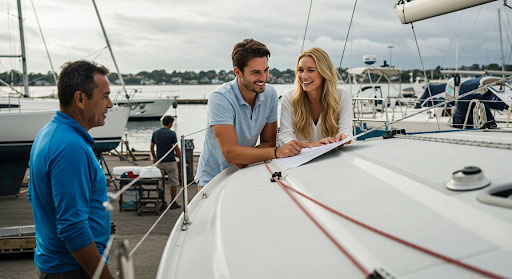 Maybe, just maybe...
Maybe, just maybe...Table of Contents
Is Buying a Boat Right for You?
"Should I buy a boat?" It’s a bit like asking "Should I get married?". Both can be a risky business, fraught with pitfalls for the unwary—particularly for first-timers. But get it right, and both can be a joyful experience. Get it wrong, and it will be noticeably less so.
While I’m definitely not going to advise on the matrimonial issue—you're on your own with that one—I will take a stab at the boat-buying question. It’s all too easy to get carried away and let your heart, rather than your head, make the decision. That way, you're likely to end up owning a boat that isn’t suited for your particular needs and aspirations.
That’s the key—you must establish precisely what your needs and aspirations are. As a lifelong sailor who’s seen it all, I can tell you that the most common mistake is falling in love with a boat before you’ve asked the hard questions. You need to be pragmatic and honest with yourself first.
To do that, you need to answer a few simple questions. Let's take a look at them in turn.
The Four Questions to Ask Yourself
1. What will I use the boat for?
This is the most important question of all. Are you a weekend sailor who wants to potter around the Solent, or are you planning to spend weeks at a time on an ocean passage?
Most likely, your usage will fall somewhere between these extremes, but you do need to be realistic in assessing your probable activity. For instance:
- Are you likely to be living aboard occasionally? This isn’t just a requirement for long-distance sailors; many boat owners will want to use their boat for their annual holiday.
- Perhaps your competitive streak will involve you in club racing or local regattas?
- Maybe you’ll want to charter her occasionally to offset costs?
Your answer here will dictate the size, type, and features of the boat you should be looking for.
 Perhaps some occasional club racing?
Perhaps some occasional club racing?2. When will I use it?
Unless you’re retired with plenty of time on your hands, your use of the boat will probably be limited to summer evenings, weekends, and the annual holiday.
Boats requiring regular preventative maintenance (think steel hulls or traditional wooden boats) will eat into the time you'd much prefer to spend sailing. If you're unrestrained by the requirement to earn an honest living, you'll be able to spend longer periods aboard and keep up with the requirements of high-maintenance boats. A well-built GRP hull, on the other hand, is a much more forgiving choice for a time-poor owner.
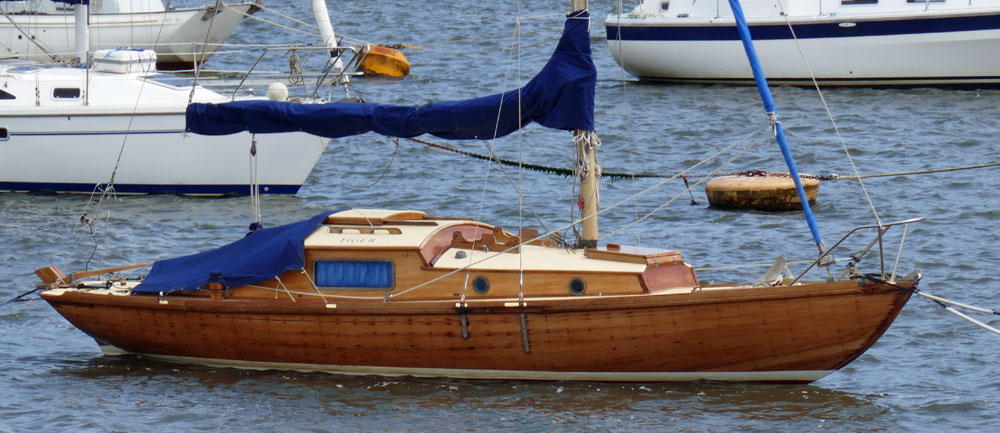 A classic wooden boat like this Folkboat will require a lot of maintenance to keep it in good condition.
A classic wooden boat like this Folkboat will require a lot of maintenance to keep it in good condition.3. Who will I be using it with?
Even singlehanders share their sailing with others occasionally, but for most of us, good company is an essential requirement for the full enjoyment of the sailing experience.
So, who do you expect to be sailing with?
- Your family?
- Just one other person (and occasional guests)?
- A full crew?
You’ll need space for them in the cockpit and, unless you’re day-sailing, a comfortable berth for each of them. Think about the layout, too—a separate cabin for the kids can be a game-changer!
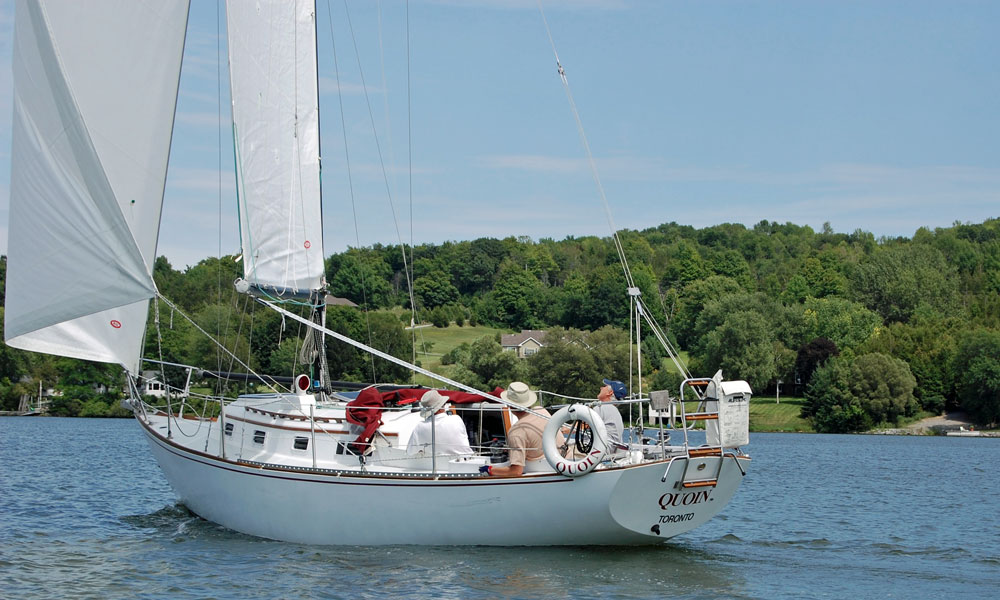 Room for four in the cockpit of this Corvette 31 cruising boat
Room for four in the cockpit of this Corvette 31 cruising boat4. Where will I keep it?
If you're fortunate enough to own a waterside property with its own dock, then the answer is obvious. For the rest of us, there are two main options: a marina or a mooring.
In a Marina The benefits of this convenient option include:
- Security: Often 24/7.
- Shelter: Usually good protection from the elements.
- Ease of access: Getting on and off is simple.
- Facilities: Availability of marine services, showers, and restaurants.
But there are disadvantages:
- Cost: Fees are based on length and beam, which is really bad news for owners of multihulls. Expect to pay around double what you would for a monohull of the same length.
- Tight Access: Even experts struggle with the shopping-trolley-like handling characteristics of a long-keeler or a boat with a single prop and twin rudders.
On a Mooring A mooring is a much cheaper alternative, but you need to understand the different types and what they entail.
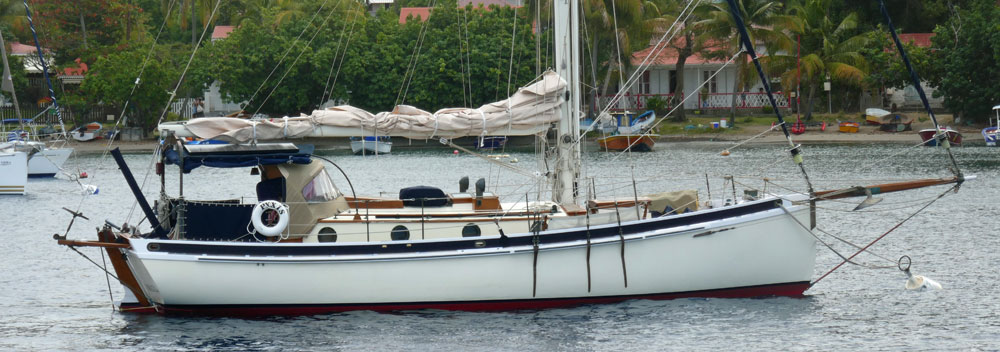 Those protuberances at either end of this attractive Pilot Cutter will add considerably to your marina bills.
Those protuberances at either end of this attractive Pilot Cutter will add considerably to your marina bills.| Mooring Type | What it is | Pros & Cons |
|---|---|---|
| Deep Water Mooring | A single-point swinging mooring that always has good depth, even at low tide. | Easy to get on and off. Much cheaper than a marina. You'll need a tender and a shoreside home for it. Security can be an issue. |
| Half-Tide Mooring | A mooring that leaves your boat high and dry for several hours on either side of low water. | The most economical option. Only suitable for boats that can "take the ground" (e.g., bilge keelers, shoal draft boats with legs, or multihulls). Access is limited to certain stages of the tide. |
| Trot Mooring | A long string of connected moorings where boats are secured fore and aft. | Gets a large number of boats into a small space. Can be extremely awkward to get on and off, especially for first-timers or when shorthanded. |
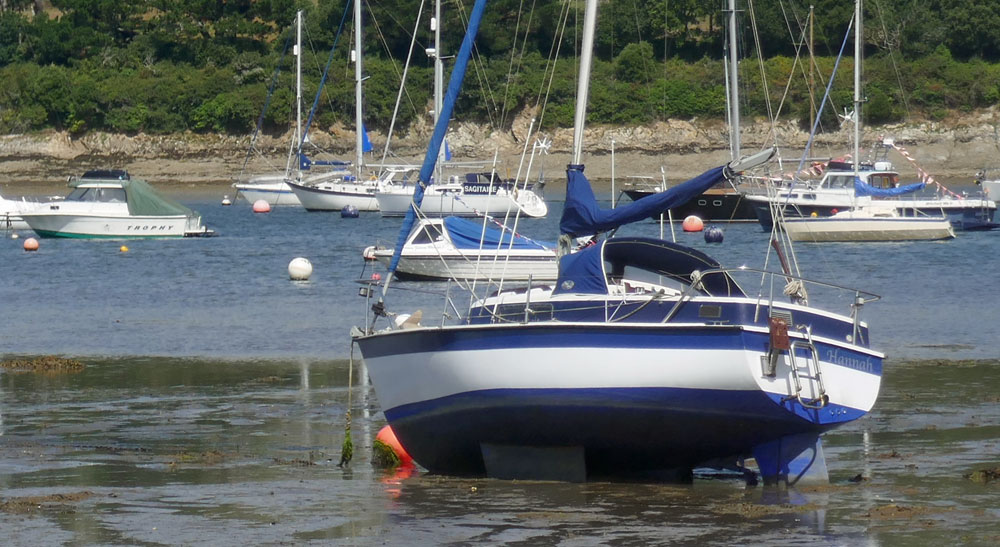 This bilge-keeled Newbridge Pioneer is dried out on a half-tide mooring, whilst the boats on deepwater moorings remain afloat.
This bilge-keeled Newbridge Pioneer is dried out on a half-tide mooring, whilst the boats on deepwater moorings remain afloat.Remember, a mooring of any kind will need an annual inspection from the seabed up if you are to have the confidence to trust it with your new boat.
The Lifestyle & Time Commitment
The prospect of sailing off into the sunset is a powerful motivator, but as any boat owner will tell you, it's not all sunshine and gentle breezes. A boat isn't a car; you can't just leave it on the drive and forget about it. It demands a significant time commitment beyond just your sailing trips. Think of it as a living, breathing project that always needs your attention.
The reality is that for every hour you spend on the water, you'll likely spend several more on maintenance and preparation. This includes everything from routine checks on the rigging and engine to annual winterisation, painting, and polishing. As a Yachtmaster, I’ve seen countless owners get disillusioned because they underestimated the sheer amount of work involved. But for those who embrace this reality, it becomes a source of pride and a way to truly connect with their vessel. You'll learn new skills and be rewarded with a profound sense of self-reliance.
What Boat is Right for Me?
Having properly considered the foregoing, you'll now have a basic idea of the type of boat that will suit your particular needs and aspirations. You are now able to answer the question yourself—and hopefully your answer is "Yes!"
Having made that admirable decision, you've now got even more to think about. The used boat market is full of so many different vessels that you'll need to whittle them down not only by what meets your needs, but also by what you have a specific aversion to.
You'll have to consider:
- Hull Material: GRP, steel, or wood? Each has its own pros and cons.
- Number of Berths: How many people do you need to sleep comfortably?
- Monohull or Multihull: A classic monohull or the stability of a catamaran or trimaran?
- Boat Length: Bigger isn't always better! A smaller boat can be easier to handle and cheaper to moor.
- Type of Rig: Sloop, cutter, ketch, or yawl? The rig affects performance and sail-handling.
- Displacement: A heavy-displacement boat offers a comfortable ride in a seaway, while a light-displacement one is faster in light winds.
- Keel and Rudder Configuration: A long keel can track better but a fin keel is more manoeuvrable.
- Steering: A classic tiller or a more modern wheel?
- Cockpit Location: A centre cockpit gives you more space and a better view from the helm, but an aft cockpit is more traditional and often feels more secure.
- Drivetrain: Conventional shaft or saildrive? Each has different maintenance requirements.
Once you have a clear idea of what you're looking for, the next step is to navigate the market to find your perfect vessel. For a comprehensive overview of the entire process, including surveys, paperwork, and legalities, be sure to check out our ultimate guide on Buying a Used Sailboat: Your Guide to Finding the Perfect Vessel.
Try Before You Buy
Before you commit to the financial and lifestyle investment of a boat, it’s a brilliant idea to try a few alternatives first. You can gain valuable experience and truly decide if boat ownership is for you without the high costs and responsibility. Here are a few options worth exploring:
- Charter a Boat: Hire a boat for a week or two, in a different location each time. This is a great way to experience different types of vessels and see what size and layout works for you and your crew.
- Join a Sailing Club or Syndicate: Many clubs offer sailing lessons and access to a fleet of boats. A syndicate, or shared ownership, lets you split the costs and responsibilities with other like-minded people.
- Take a Certification Course: Enrolling in an RYA or other reputable course will not only teach you the necessary skills but will also confirm your passion for sailing.
 Trot Moorings owned and operated by the Tamar River Sailing Club in Devon, UK
Trot Moorings owned and operated by the Tamar River Sailing Club in Devon, UK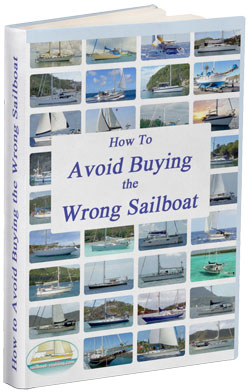
Download my eBook 'How to Avoid Buying the Wrong Sailboat!
It's not free sadly, but its $9.99 price tag could save you $$$$$$s.
Low Cost, but High Value!
Summing Up
Buying a boat is a significant financial and emotional investment, but it’s one that can pay you back in a currency far more valuable than money: a lifetime of incredible memories, skills, and experiences. The key is to approach the decision with a clear head, not just a romantic vision. By asking yourself the hard questions first—what you'll use it for, who you'll sail with, and where you'll keep it—you’ll be able to identify the right type of boat for you. Once you know that, you can begin the exciting hunt for your perfect vessel with confidence, knowing you're making a choice you won't regret.
This article was written by Dick McClary, RYA Yachtmaster and author of the RYA publications 'Offshore Sailing' and 'Fishing Afloat', member of The Yachting Journalists Association (YJA), and erstwhile member of the Ocean Cruising Club (OCC).
Frequently Asked Questions
Q: Is it always a bad financial decision to buy a boat?
Q: Is it always a bad financial decision to buy a boat?
A: From a strict investment standpoint, a boat is almost always a depreciating asset. However, the value of the experiences, freedom, and memories it provides often outweighs the financial cost for passionate sailors.
Q: Should I buy a new or a used boat?
Q: Should I buy a new or a used boat?
A: For a first-time buyer, a used boat is often a sensible choice. The initial depreciation has already occurred, and you can get more boat for your money. Just be sure to get a professional survey to check for hidden issues.
Q: Do I need a licence to operate a boat in the UK?
Q: Do I need a licence to operate a boat in the UK?
A: There is no legal requirement to have a licence for a private boat in the UK. However, training and qualifications like the RYA Yachtmaster are essential for gaining the skills and confidence to handle a vessel safely.
Q: How much should I budget for annual running costs?
Q: How much should I budget for annual running costs?
A: A common rule of thumb is to budget at least 10% of the boat’s value for annual expenses like insurance, mooring fees, maintenance, and repairs. This figure can be higher for older vessels.
Q: How do I find the right boat for me?
Q: How do I find the right boat for me?
A: Once you’ve answered the key questions about your needs and aspirations, you should research boat listings on reputable websites and consider working with a yacht broker. Always arrange a survey and a sea trial before committing to a purchase.
Resources Used
Recent Articles
-
Island Packet 40 Review: Specs, Performance & Cruising Analysis
Feb 09, 26 05:05 AM
An in-depth review of the Island Packet 40 sailboat. Explore technical specifications, design ratios, and real-world cruising performance for this legendary blue-water cruiser. -
Beneteau Oceanis 331 Clipper Review: Specs, Performance & Ratios
Feb 04, 26 07:25 PM
A comprehensive review of the Beneteau Oceanis 331 Clipper sailboat. We analyse design ratios, interior layout, and performance for prospective cruising owners. -
Self-Tacking Headsails: Track Systems vs Hoyt Jib Booms
Feb 03, 26 06:26 AM
Master the mechanics of self-tacking headsails. We compare traditional club-footed rigs, curved tracks, and the superior Hoyt Jib Boom for offshore sailing.